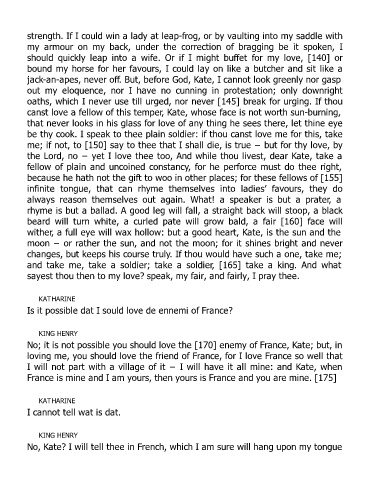Page 1727 - Shakespeare - Vol. 2
P. 1727
strength. If I could win a lady at leap-frog, or by vaulting into my saddle with
my armour on my back, under the correction of bragging be it spoken, I
should quickly leap into a wife. Or if I might buffet for my love, [140] or
bound my horse for her favours, I could lay on like a butcher and sit like a
jack-an-apes, never off. But, before God, Kate, I cannot look greenly nor gasp
out my eloquence, nor I have no cunning in protestation; only downright
oaths, which I never use till urged, nor never [145] break for urging. If thou
canst love a fellow of this temper, Kate, whose face is not worth sun-burning,
that never looks in his glass for love of any thing he sees there, let thine eye
be thy cook. I speak to thee plain soldier: if thou canst love me for this, take
me; if not, to [150] say to thee that I shall die, is true − but for thy love, by
the Lord, no − yet I love thee too, And while thou livest, dear Kate, take a
fellow of plain and uncoined constancy, for he perforce must do thee right,
because he hath not the gift to woo in other places; for these fellows of [155]
infinite tongue, that can rhyme themselves into ladies’ favours, they do
always reason themselves out again. What! a speaker is but a prater, a
rhyme is but a ballad. A good leg will fall, a straight back will stoop, a black
beard will turn white, a curled pate will grow bald, a fair [160] face will
wither, a full eye will wax hollow: but a good heart, Kate, is the sun and the
moon − or rather the sun, and not the moon; for it shines bright and never
changes, but keeps his course truly. If thou would have such a one, take me;
and take me, take a soldier; take a soldier, [165] take a king. And what
sayest thou then to my love? speak, my fair, and fairly, I pray thee.
KATHARINE
Is it possible dat I sould love de ennemi of France?
KING HENRY
No; it is not possible you should love the [170] enemy of France, Kate; but, in
loving me, you should love the friend of France, for I love France so well that
I will not part with a village of it − I will have it all mine: and Kate, when
France is mine and I am yours, then yours is France and you are mine. [175]
KATHARINE
I cannot tell wat is dat.
KING HENRY
No, Kate? I will tell thee in French, which I am sure will hang upon my tongue

